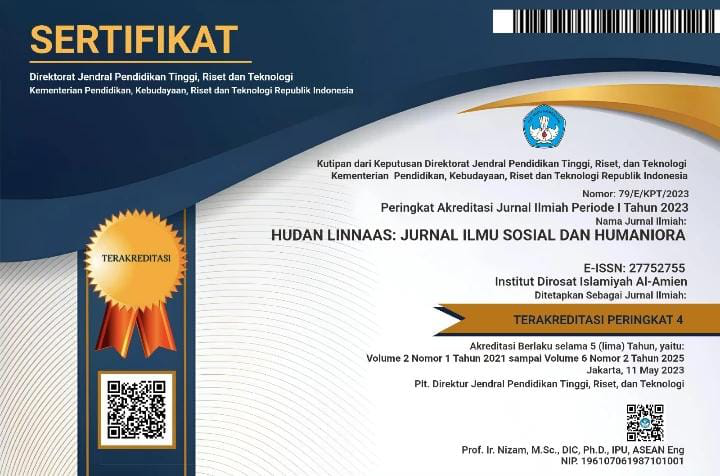KAJIAN META- ANALISIS INOVASI PENGAJARAN USUL FIQH DI INDONESIA
Abstract
Abstract: Studies related jurisprudence growing rapidly around the Muslim world, including Indonesia. Hence there is need to analyze previous studies on inovation teaching jurisprudence that has been undertaken to identified pattern and disposition of the research conducted. The objective of this study was to determine the pattern and research gaps exist in the field that have been done earlier researchers. Qualitative methods were used in this study. The study systematically analysed articles related innovation in teaching jurisprudence in Indonesia from 2009 to 2018. The findings from the analysis show most of the studies that have been conducted focusing on the need to reform of jurisprudence in Indonesia. Therefore, analysis showed that the approach using qualitative methods most often used where the field study is the most preferred method. The findings of this study can be used as a reference to the study of jurisprudence related to teaching innovation in Indonesia. This article provides suggestions for further research related to innovation in teaching jurisprudence.
Keyword: Innovation, teaching jurisprudence, knowledge of jurisprudence, Indonesia, Meta-Analysis.
References
RUJUKAN
Abdul Karim, M. A. (2013). Pola Pemikiran Imam Syafi’i dalam Menetapkan Hukum Islam. Jurnal Adabiyah Vol. XIII nomor, 187. http://journal.uin-alauddin.ac.id/index.php/adabiyah/article/view/269
Aminudin, S. (2018). Standarisasi Kurikulum Ushul Fiqh. MISYKAT: Jurnal Ilmu-ilmu Al-Quran, Hadist, Syari'ah dan Tarbiyah, 1(2), 139. http://dx.doi.org/10.33511/misykat.v1n2.139
Anwar, M. Z. (2016). Pengkajian Ushul Fiqh Bagi Pemula di PTKI: Tantangan, Refleksi dan Evaluasi. EMPIRISMA: JURNAL PEMIKIRAN DAN KEBUDAYAAN ISLAM, 25(2). https://doi.org/10.30762/empirisma.v25i2.180
Arifin, S. (2019). Model Pembelajaran Ushul Fiqih Berdimenasi Soft Skils. Jurnal Tatsqif, 17(2), 11-29. https://doi.org/10.20414/jtq.v17i2.974
Baumert, J., Kunter, M., Blum, W., Brunner, M., Voss, T., Jordan, A., . . . Tsai, Y.-M. (2010). Teachers’ mathematical knowledge, cognitive activation in the classroom, and student progress. American educational research journal, 47(1), 133-180. https://doi.org/10.3102/0002831209345157
Dahlan, M. (2012). Paradigma usul fikih multikultural di Indonesia. Ijtihad: Jurnal Wacana Hukum Islam dan Kemanusiaan, 12(1), 1-19. https://doi.org/10.18326/ijtihad.v12i1.1-19
Depaepe, M. (2012). Between educationalization and appropriation: Selected writings on the history of modern educational systems: Leuven University Press.
Fung, D., Kutnick, P., Mok, I., Leung, F., Lee, B. P.-Y., Mai, Y. Y., & Tyler, M. T. (2017). Relationships between teachers’ background, their subject knowledge and pedagogic efficacy, and pupil achievement in primary school mathematics in Hong Kong: An indicative study. International Journal of Educational Research, 81, 119-130. https://doi.org/10.1016/j.ijer.2016.11.003
Goos, M. (2013). Knowledge for teaching secondary school mathematics: what counts? International Journal of Mathematical Education in Science and Technology, 44(7), 972-983. https://doi.org/10.1080/0020739X.2013.826387
Gudmundsdottir, S., & Shulman, L. (1987). Pedagogical content knowledge in social studies. Scandinavian Journal of Educationl Research, 31(2), 59-70. https://doi.org/10.1080/0031383870310201
Hussin, N. (2017). Penggunaan laman web sebagai transformasi dalam pengajaran dan pembelajaran pendidikan Islam. O-JIE: Online Journal of Islamic Education, 1(2). https://ojie.um.edu.my/article/view/5534
Ihsan, A. G. (2018). Pengembangan Ilmu Ushul Al Fiqh. Al-Ahkam: Jurnal Ilmu Syari'ah dan Hukum, 2(2), 105-121. http://dx.doi.org/10.22515/al-ahkam.v2i2.1069
Ilyas, H. H., & Ag, M. (2018). Fikih Akbar: Prinsip-Prinsip Teologis Islam Rahmatan Lil ‘Alamin: Pustaka Alvabet.
Jannah, R. (2019). Internalisasi Paradigma Ushul Fiqh Melalui Pembelajaran Inovatif. Paper presented at the Seminar Nasional Pendidikan 2015. http://seminar.umpo.ac.id/index.php/semnasdik2015/article/viewFile/223/224.
Johari, K., Ismail, Z., Osman, S., & Othman, A. T. (2009). Pengaruh Jenis Latihan Guru dan Pengalaman Mengajar Terhadap Efikasi Guru Sekolah Menengah (The Influence of Teacher Training and Teaching Experience on Secondary School Teacher Efficacy). Jurnal Pendidikan Malaysia (Malaysian Journal of Education), 34(2), 3-14. http://pkukmweb.ukm.my/~jurfpend/index.html
Khoiri, N. (2017). The Mapping Of Renewal Of ‘Usul Fiqh’Thoughts In Indonesia. International Journal on Language, Research and Education Studies, 1(1), 18-33. http://jurnal.uinsu.ac.id/index.php/ijlres/article/view/939
Kilpatrick, J., Swafford, J., & Findel, G. (2001). Teaching for mathematical proficiency. Adding it up: Helping children learn mathematics, 313-368. DOI 10.17226/9822
Kunter, M., Klusmann, U., Baumert, J., Richter, D., Voss, T., & Hachfeld, A. (2013). Professional competence of teachers: Effects on instructional quality and student development. Journal of Educational Psychology, 105(3), 805. DOI: 10.1037/a0032583
Luetz, J. M., Margus, R., & Prickett, B. (2019). Human Behavior Change for Sustainable Development: Perspectives Informed by Psychology and Neuroscience. In W. Leal Filho, A. M. Azul, L. Brandli, P. G. Özuyar, & T. Wall (Eds.), Quality Education (pp. 1-16). Cham: Springer International Publishing.
Nugroho, A. (2005). Fikih Kiri: Revitalisasi Usul al-Fiqh untuk Revolusi Sosial. Al-Jami'ah: Journal of Islamic Studies, 43(2), 425-454. https://doi.org/10.14421/ajis.2005.432.425-454
Qutb, S. M. (1992). Petunjuk Sepanjang Jalan. Kuala Lumpur: Crescent News Sdn. Bhd.
Rusli, R. (2013). Pedagogi Usul Al Fiqh Berbasis Pendidikan Perdamaian Di Era Multikultural. ULUL ALBAB Jurnal Studi Islam, 12(2), 139-156. http://dx.doi.org/10.18860/ua.v0i0.2387
Salamah, U. (2017). Teori Pengetahuan Hukum Dalam Ushul Fikih (Kajian Teori Hukum Alam). QISTIE, 10(2). http://dx.doi.org/10.31942/jqi.v10i2.2075
Sapiudin, S. (2014). Pembelajaran ushul Fikih Berbasis Masalah. AHKAM: Jurnal Ilmu Syariah, 14(2). DOI: 10.15408/ajis.v14i2.1288
Sapiudin, S., Nata, A., & Syihab, U. (2016). Model Pembelajaran Ilmu Ushûl Fiqh di Jurusan Pendidikan Agama Islam (Analisis Penerapan Model Pembelajaran Konvensional dan Pembelajaran Berbasis Masalah). TA'DIBUNA, 5(1), 60-83. http://dx.doi.org/10.32832/tadibuna.v5i1.571
Segall, A. (2004). Revisiting pedagogical content knowledge: the pedagogy of content/the content of pedagogy. Teaching and teacher education, 20(5), 489-504. DOI: 10.1016/j.tate.2004.04.006
Suartama, I. K. (2010). Pengembangan mutimedia untuk meningkatkan kualitas pembelajaran pada mata kuliah media pembelajaran. Jurnal Pendidikan dan Pengajaran, 43(3). http://dx.doi.org/10.23887/jppundiksha.v43i3.130
Thabrani, A. M. (2013). Pengembangan Fiqh al-‘Ilmiyah Melalui Pendekatan Mashlahah dan Tajdid. AL-IHKAM: Jurnal Hukum & Pranata Sosial, 6(2), 184-200. ejournal.stainpamekasan.ac.id
Webster, J., & Watson, R. T. (2002). Analyzing the past to prepare for the future: Writing a literature review. MIS quarterly, xiii-xxiii. DOI: 10.2307/4132319
Zarkasyi, A. F. (2013). Tajdid dan Modernisasi Pemikiran Islam. TSAQAFAH, 9(2), 395-418. http://dx.doi.org/10.21111/tsaqafah.v9i2.59
Zimmerman, R. D., Murillo-Sánchez, C. E., & Thomas, R. J. (2010). MATPOWER: Steady-state operations, planning, and analysis tools for power systems research and education. IEEE Transactions on power systems, 26(1), 12-19. DOI: 10.1109/TPWRS.2010.2051168
DOI: 10.28944/hudanlinnaas.v2i1.232
Refbacks
- There are currently no refbacks.

This work is licensed under a Creative Commons Attribution-NonCommercial-ShareAlike 4.0 International License.







.png)